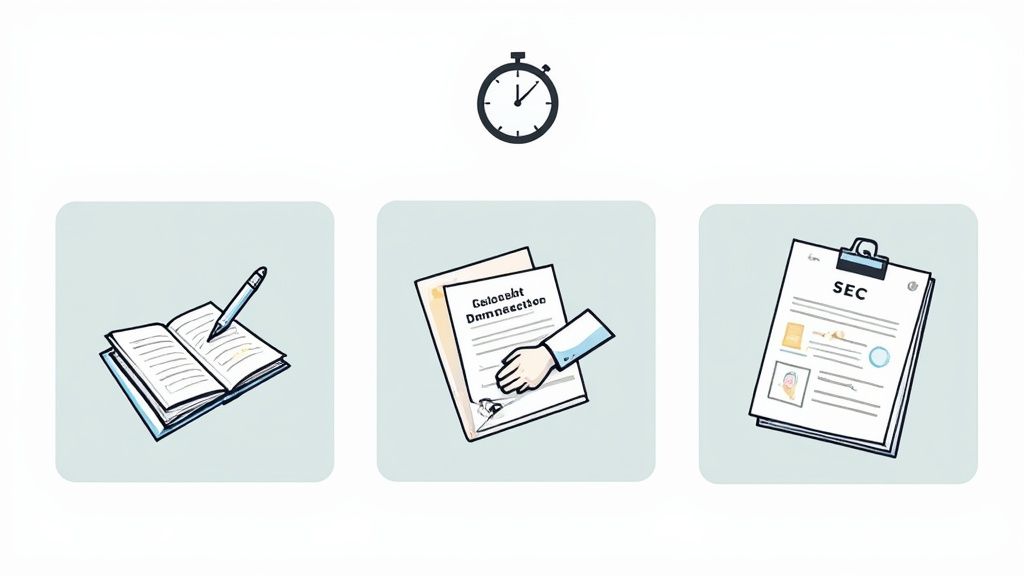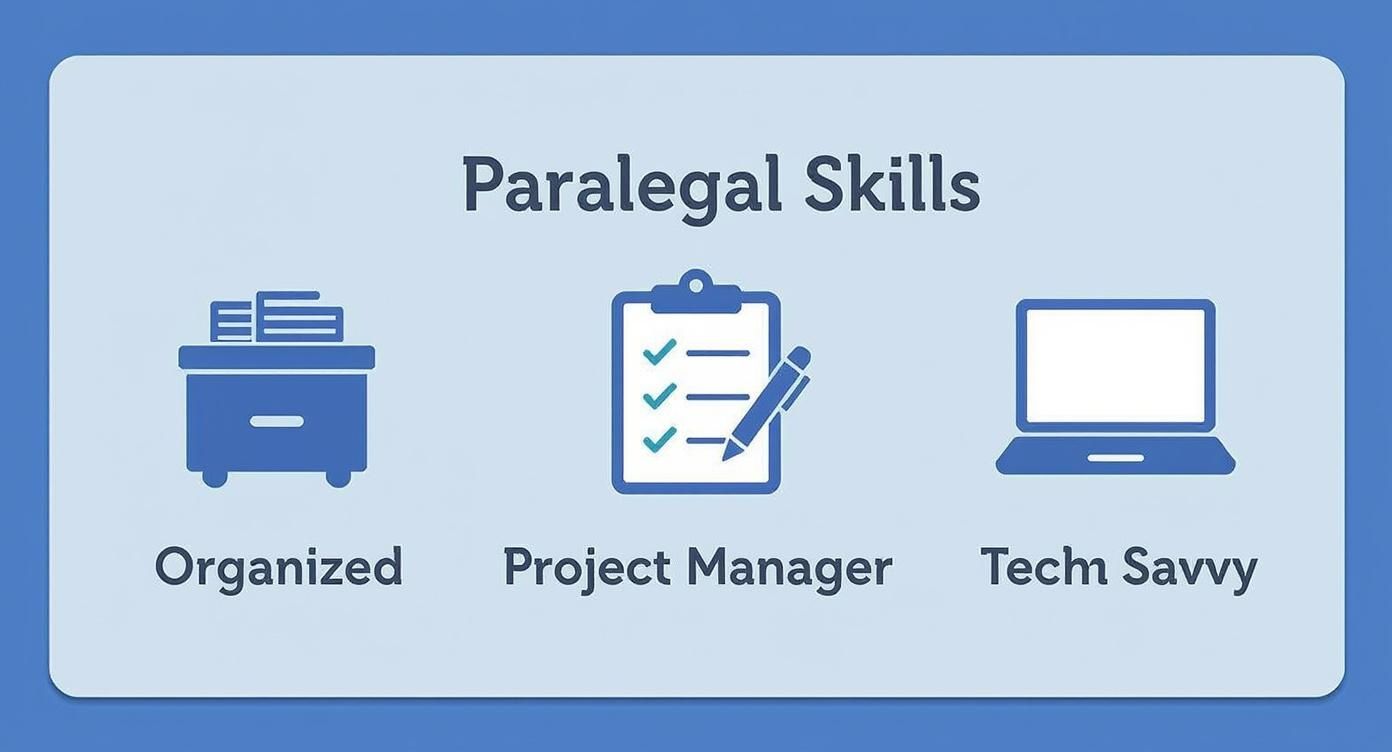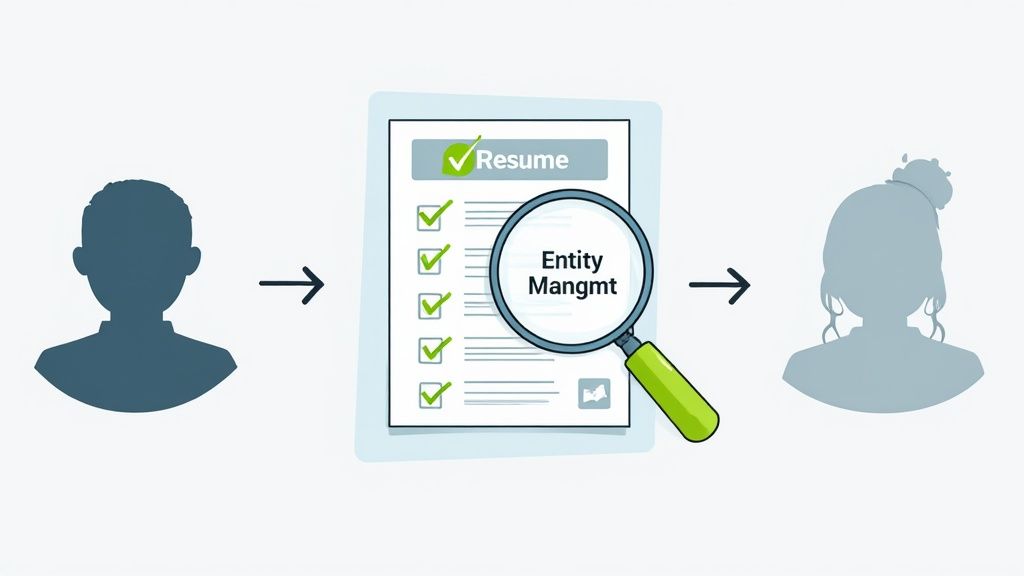
 18 minutes read
18 minutes read
Let's be honest. You're drowning in paperwork, compliance deadlines are a recurring nightmare, and every M&A deal feels like you're trying to herd cats while juggling flaming torches. This is where a corporate paralegal doesn't just help—they save you. They own the critical, behind-the-scenes legal work that lets a company operate smoothly, stay compliant, and actually grow without tripping over its own legal feet. They are the operational linchpin for everything from incorporation to acquisition.
So, what does a corporate paralegal really do? Forget the outdated image of someone just filing papers. That’s like saying a CEO just answers emails.
Think of them as the COO of your legal function—the person who actually runs the machine while the attorneys steer the ship. They’re the ones keeping the engine humming, ensuring that the thousand-and-one details of corporate law don't bring your business to a grinding halt.
If your lawyers are spending their expensive hours chasing signatures for board minutes or managing state registration renewals, you're not just wasting money. You're actively burning your most valuable strategic resource. That's a rookie mistake, and it's one we've seen cripple growth-stage companies time and time again.
A great corporate paralegal steps in to own these essential, but mind-numbingly tedious, processes. They become the single source of truth for your company's legal and structural history.
This isn't just about administrative offloading. It's about building a legal foundation that can actually scale. When investors start kicking the tires during due diligence, who do you think has all the corporate records, stock ledgers, and board consents perfectly organized? It won't be the founder who's busy pitching, and it damn well shouldn't be the high-priced lawyer.


A sharp corporate paralegal transforms your legal department from a reactive cost center into a proactive, organized asset. They don't just complete tasks; they build and manage the systems that prevent legal fires in the first place.
This structured approach is becoming non-negotiable. The global legal services market is massive, with the corporate segment accounting for over 31% of the total revenue. That number alone screams how intense the demand is for this specific skill set. To keep up, a modern paralegal's toolkit is increasingly digital, with studies showing 83% of law firms globally are now using legal tech to make this work more efficient.
Hiring one is an investment in operational sanity. It’s the difference between fumbling through your next big transaction and executing it flawlessly. With the rise of specialized talent, finding the right fit is easier than ever. You can explore the benefits of on-demand talent by reading our guide on virtual paralegal employment. This role is your secret weapon for growth.
To put it in concrete terms, here’s a quick breakdown of what a corporate paralegal actually owns and how it directly saves your butt.
| Area of Responsibility | What It Actually Means for Your Business |
|---|---|
| Corporate Governance & Maintenance | Keeps your company from getting fined into oblivion by state and federal agencies, manages minute books, and handles annual reports. |
| Transaction & Deal Support | Manages data rooms for M&A, assists with due diligence, and drafts ancillary documents. This speeds up deals and lowers your outrageous legal bills. |
| Entity Formation & Management | Forms new LLCs or corporations and handles foreign qualifications so your business structure is legally sound from day one. |
| Contract Management | Organizes, tracks, and manages the lifecycle of your company's contracts. This prevents you from getting ambushed by an auto-renewal you forgot about. |
| Compliance & Filings | Prepares and files documents with the SEC and other regulatory bodies. This keeps you compliant and avoids the massive headaches of regulatory scrutiny. |
In short, they take the complex, time-consuming legal logistics off your plate, freeing up attorneys and executives to focus on stuff that actually makes money.
So you think you know what a corporate paralegal does. Filing, right? Maybe a little bit of scheduling? If that’s your mental picture, let's set the record straight. A great corporate paralegal isn't an admin; they're the project manager for your company's entire legal lifecycle.
Forget the glorified secretary trope. The real work is far more complex and absolutely critical. While you’re out raising capital, they're in the trenches managing the legal infrastructure that makes it all possible. Their day is a high-stakes juggling act that keeps your business afloat and out of trouble. Let's pull back the curtain.

First, there’s corporate governance. It sounds formal and, let’s be honest, parts of it are bone-dry. But it’s the absolute bedrock of a legally sound company. Get this wrong, and you'll find out the hard way during your next audit or fundraising round.
A corporate paralegal owns this. They’re not just taking notes in board meetings; they are drafting the resolutions, securing the proper signatures, and meticulously maintaining the official "minute book" that serves as your company's legal diary.
Think about it. Every major decision, from issuing stock to appointing a new director, needs to be documented perfectly. Your paralegal makes sure it happens, so when an investor's legal team comes digging, you have everything locked down. This isn't just about tidiness; it’s about corporate survival.
Next up: transactional support. If you enjoy managing a chaotic mess of NDAs, term sheets, and closing documents, you might be the exception. For everyone else, that's what every M&A deal looks like without a pro running point.
This is where a corporate paralegal truly shines, stepping in as the quarterback for the deal's administrative side.
Without them, your high-priced attorneys get bogged down in administrative muck, and your deal timeline stretches into infinity. The paralegal keeps the train on the tracks.

This role is the difference between a smooth, efficient transaction and a frantic, last-minute fire drill that costs you time, money, and sanity. They manage the chaos so your lawyers can focus on strategy.
Finally, there’s the ever-present beast of securities and compliance. This is the stuff that keeps CFOs up at night. For public companies, or those on the path to becoming one, getting this right is non-negotiable.
Your corporate paralegal is the first line of defense. They handle the nitty-gritty of SEC filings that most founders would rather not think about.
They are also instrumental in ensuring operational consistency. This often means actively contributing to—or even developing—the very playbooks that keep things running smoothly, like creating standard operating procedures for recurring legal tasks. In essence, they don't just follow the rules; they help build the systems that make following the rules second nature.
So you've seen what a corporate paralegal does. Now, let’s talk about what makes one great. Anyone can list "detail-oriented" on a resume, but a truly top-tier corporate paralegal brings skills that go way beyond buzzwords. A polished CV doesn't tell you if they'll crumble when a multi-million dollar deal is closing at midnight.
Hiring the wrong person isn't an inconvenience; it's a liability.
You need someone who does more than just tick boxes. You need a professional who can think five steps ahead, communicate clearly with demanding executives, and manage utter chaos without breaking a sweat.
Think of this as our battle-tested checklist for spotting an A-player. These are the skills that separate the seasoned pros from the amateurs who will end up costing you your sanity.
Let's start with the basics. Of course, a corporate paralegal needs a rock-solid grasp of corporate law. That’s the absolute baseline.
But the skills that really set someone apart are the ones that turn that knowledge into action.
This last point is crucial. The legal field is finally catching up, and the legal tech market is on track to hit $26.2 billion by 2025, fueled by tools that automate this exact work. Your ideal candidate is already using them. You can find more on this in the state of the 2025 legal market report.
This is where the real magic happens. In the high-stakes corporate world, "soft skills" are actually the hardest skills to find and, frankly, the most valuable. They're what elevates a paralegal from good to completely indispensable.
Because managing a dozen different personalities during a stressful negotiation? Yeah, that’s part of the job.

A paralegal who can draft a perfect resolution is good. A paralegal who can also calm down an anxious founder and tactfully chase down a signature from a busy board member is a game-changer. They manage people just as much as they manage paper.
Here’s what to look for:
Let’s get one thing straight right now: a paralegal is not just a paralegal. Thinking they’re interchangeable is like asking a brilliant pastry chef to grill the perfect steak. Sure, they both work in a kitchen, but the skills are worlds apart.
You’d be surprised how many founders learn this the hard way, hiring someone with an impressive legal resume only to find they're completely lost in the corporate world.
It all boils down to this: one lives in a world of offense and defense; the other thrives in a world of building and maintaining.
Here’s the simplest way to frame it. A litigation paralegal is a warrior, trained for battle. Their entire professional life revolves around conflict—lawsuits, disputes, and adversarial proceedings. Their job is to help an attorney win a fight.
A corporate paralegal, on the other hand, is an architect. Their job is to build and maintain the company's legal framework to prevent fights from ever breaking out. Their mindset is proactive and transactional, not reactive and adversarial.

You're hiring for two fundamentally different jobs. One is trained to manage a crisis that has already happened. The other is trained to build the systems that stop crises from happening in the first place.
This isn't a subtle distinction. It’s a canyon-sized gap. Confusing the two is like mixing up your sales team with your accounting department—both work with numbers, but you wouldn't ask one to do the other's job.
This infographic provides a quick look at the foundational skills for any top-tier corporate paralegal.

As you can see, the emphasis is heavily on structure, organization, and forward-planning—a stark contrast to the reactive nature of litigation.
To really drive the point home, let's put these two roles side-by-side.
| Key Aspect | Corporate Paralegal | Litigation Paralegal |
|---|---|---|
| Primary Goal | Facilitate business transactions & ensure compliance | Help win a legal dispute or lawsuit |
| Work Environment | Transactional, deadline-driven (deals, filings) | Adversarial, deadline-driven (court, discovery) |
| Core Mindset | Proactive & preventative | Reactive & strategic |
| Key Documents | Contracts, closing docs, board minutes, SEC filings | Pleadings, discovery requests, motions, trial binders |
| Daily Rhythm | Governed by deal timelines & corporate calendars | Governed by the Rules of Civil Procedure & court orders |
| Definition of "Win" | A smooth closing, a clean audit, perfect compliance | A favorable verdict, a strategic settlement |
Seeing them laid out like this makes it painfully obvious: you’re hiring for two completely different disciplines.
A litigation paralegal might spend their morning drafting interrogatories and their afternoon summarizing depositions. For a closer look, check out our deep dive into what a litigation paralegal does.
Meanwhile, a corporate paralegal is managing the closing of a Series B financing round. They’re chasing down signatures for a merger agreement, filing a Form D with the SEC, and meticulously updating the company’s capitalization table.
Trying to drop a litigation expert into a high-stakes M&A closing is a recipe for disaster. It’s a completely different language. Understanding this difference is the single most important step to avoid a bad hire that sets your company back months.
So, you're convinced. You're ready to make a move. Now comes the tricky part: actually finding one.
Stop. Right. There. Tossing a generic job post onto a massive online board is a rookie mistake. It's a surefire way to get buried under a mountain of resumes from people who think "corporate law" is a fancy term for office admin.
So, how do you attract a real pro without wasting months sifting through unqualified applicants? You need a game plan.

First things first: your job description isn’t a wish list. It’s a filter. Its main purpose is to attract the right people and actively discourage the wrong ones. Stop using vague fluff like "detail-oriented team player" and get brutally specific.
What does that look like? Instead of “experience with corporate filings,” try “Managed multi-state annual report filings and foreign qualifications for a portfolio of 30+ entities.” Instead of “assists with M&A,” try “Experience managing virtual data rooms and drafting closing certificates for Series A and B financing rounds.”
The more specific you are, the more likely you are to attract candidates who have actually done the work. It’s the difference between asking for a "cook" and asking for someone who can perfectly execute a beef wellington. We’ve put together some detailed guidance on this, which you can find in our guide at https://hireparalegals.com/corporate-paralegal-job-description/.
Once you have a few promising candidates, dig deeper than the standard “tell me about a time when…” questions.
Probe for real, in-the-trenches experience. Here are a few insider questions we use to separate the contenders from the pretenders:
A seasoned corporate paralegal will have ready answers. An amateur will stumble—and that’s what you want to discover before you make an offer.
Now for everyone's favorite topic: compensation. The short answer is, you get what you pay for. Lowballing this role is a surefire way to hire someone who creates more problems than they solve.
But that doesn’t mean you have to break the bank. The rise of specialized, on-demand talent has completely changed the game. You can now tap into a pool of pre-vetted, highly experienced corporate paralegals without the overhead of a full-time hire.

This is about being smart with your resources. Why pay a premium for someone to sit in your office when the most critical work happens digitally anyway? Focus on the skill, not the zip code.
This strategic approach is catching on fast. The U.S. legal services market, valued at USD 292.08 billion, is projected to soar to USD 466.42 billion by 2034. This growth is fueled by a need for specialized, cost-effective support, which explains why 78% of law firms plan to hire specialized paralegals in the next few years.
When thinking about hiring, it helps to understand the modern landscape. Look into the best legal recruitment firms to partner with to see how different models stack up. Services like ours (toot, toot!) cut through the noise by pre-vetting candidates so you’re only interviewing proven professionals. This drastically reduces your hiring time and ensures you’re getting someone who can hit the ground running on day one.
We hear these all the time. After you’ve spent enough years in the legal trenches, you notice the same uncertainties cropping up again and again. Here are the straight, no-fluff answers.
Let's use an analogy. A legal assistant is the hospital administrator who manages scheduling and keeps the operation running. The corporate paralegal is the specialized surgical nurse—they're in the room performing substantive, critical tasks under the surgeon's (the attorney's) supervision.
A corporate paralegal does real, substantive legal work. They're drafting stock option agreements and managing complex compliance filings. This role demands deep, specialized knowledge far beyond general organizational skills.
Absolutely. In fact, many are more effective when working remotely. So much of their job is already digital, from e-filing with the Secretary of State to managing virtual data rooms. The days of needing someone physically chained to a filing cabinet are long gone.
With secure cloud-based systems, a remote paralegal can be just as integrated and productive as an in-house one—often without the overhead. The key isn't their physical location; it's their experience.

Don't confuse physical presence with productivity. A top-tier remote paralegal can run circles around a mediocre in-office hire, often at a fraction of the cost. It’s about skill, not proximity.
Yesterday. Kidding… mostly. The real trigger is when legal admin work starts pulling you or your attorney away from high-value tasks. Are you spending afternoons chasing signatures for board consents instead of negotiating term sheets? That’s your sign.
Other red flags include preparing for a fundraising round or feeling like your contract volume has become a serious bottleneck. If you wait until you're drowning, you’re already too late. Hire proactively the moment you see these storm clouds on the horizon.
Here’s an opinion that might be unpopular: not necessarily. While a paralegal certificate shows a solid educational foundation, it’s no substitute for battle-tested, real-world experience.
You shouldn't automatically dismiss a candidate without a piece of paper if they have a proven five-year track record of managing M&A deals at a company just like yours. Focus on demonstrated experience over credentials alone. We’ve seen brilliant paralegals with no certification and certified paralegals who couldn't manage a simple closing checklist. Judge the results, not the resume.